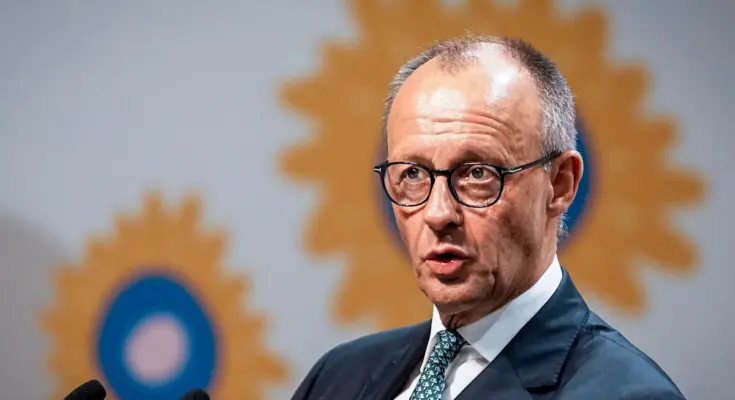The UN climate conference in Brazil ended in a rough compromise that hurt the EU and Germany. No one is following their strict climate policies and self-proclaimed pioneers – even though there are elegant solutions to solving the climate problem.
The results of the COP30 UN climate conference in Brazil illustrate the failure of Germany’s climate policy. The three largest CO₂ emitters – China, the United States and India – are responsible for about half of the world’s total emissions, and together with the BRICS countries and oil-producing countries in the Middle East, their contribution accounts for about two-thirds. However, none of these countries is willing to reduce their emissions in the short term.
However, the EU and Germany have tightened their climate goals and no longer want to produce net CO₂ by 2050 or 2045. Meanwhile, the heads of state of other western countries such as Canada, Australia and Japan, while officially having similar goals, announced that they want to prioritize economic prosperity over climate protection, as have China and the United States as Europe’s biggest competitors.
The COP30 final document suits them, but the EU and Germany continue to see themselves in a “pioneer role” and continue to make their energy more expensive.
There was only “progress” at the climate conference in terms of increasing financial aid from Western countries to other countries: the final document predicted “adaptation financing” would triple to $120 billion by 2035; As much as $300 billion in “climate aid” will flow to poor countries every year, with the possibility of much more.
However, an EU-backed plan to phase out fossil fuels by 2040 has not received approval from the global community. This is natural because developing countries depend on fossil energy. Otherwise, COP30 reiterated that countries must comply with and tighten their climate targets to minimize exceeding the 1.5 degree target. However, of the major countries, only the EU and Germany comply with this.
While Germany plans to dismantle its urban gas network, China is winning the climate poker. How could this defeat happen? The most important reason:
Blindness to reality
“More and more companies are moving their production abroad due to high electricity costs and the ban on combustion,” analyzes economist Hans Werner Sinn. “EU requirements force deindustrialization. And unfortunately, much of the fuel we no longer buy flows to our competitors on world markets, where as much CO₂ is released into the air as we are avoiding.”
These words cut to the heart of Germany’s climate policy, which has been failing given abysmal energy prices and the loss of thousands of industrial jobs every month, but is continuing at full speed.
EU and especially German negotiators at the climate conference ensured that the pressure was increased to the maximum by including the 1.5 degree target, which climate researchers had rejected as unrealistic, in the Paris climate agreement. That goal has backfired, explains climate researcher Glen Peters of the Center for International Climate Research (CICERO) in Oslo: Anyone who would consider abandoning the 1.5-degree target would be vilified as a “climate skeptic”. “We need to remove this stigma and focus on what needs to happen,” demanded the climate scenario expert.
But the opposite is true: Federal Environment Minister Carsten Schneider (SPD) underlined its importance: The 1.5 degree target is “one of the most important international legal foundations for addressing the climate crisis,” said Schneider on the occasion of COP30. Considering the social consequences, this attitude can be seen as completely irresponsible.
Yale University economist William Nordhaus, the only Nobel Prize winner in climate economics, has long emphasized that reaching the 1.5 degree target would be economically devastating; He even criticized the 2 degree target as too expensive. But one of the characteristics of climate conferences is that economic principles are suspended there. The most important thing is that promises sound good.
Moralization instead of climate protection
For a long time, phrases about climate policy could be said “for free” and received thunderous applause. Gradually the impacts become apparent – energy prices, migration, job losses – and the mood changes. Roger Pielke Junior, a climate policy expert at the American Enterprise Institute, formulated an oft-confirmed “iron rule” of climate policy: When environmental goals and economic goals conflict, economic goals prevail in the political debate. Society is willing to pay a certain price for climate protection, but the costs are small.
Climate policy takes this into account. Forsch, Germany joined the “Powering Past Coal Alliance,” an alliance of countries that wants to phase out coal energy by 2040, even though Germany is also phasing out nuclear power plants at the same time, and is in the midst of an energy crisis – a prime example of moralizing and symbolically charged politics.
Despite the economic crisis, German representatives also acted as advocates for a drastic energy transition in Brazil. While the motto in most countries is: “First build the new, then tear down the old,” Germany is leading the way by tearing down its energy systems and infrastructure before working alternatives are available at a reasonable cost.
There has not been an energy transition taking place worldwide, but rather an energy addition: countries are expanding solar and wind power capacities, but fossil energy is increasing.
Unilateral climate goals
Although Germany and Europe have reduced their CO₂ emissions significantly since 1990, this success is not reflected in global emissions which continue to rise. Nevertheless, the country’s politicians and media are focused on the so-called “sectoral goals”, which stipulate that CO₂ emissions should fall drastically in all areas of society in Germany – even confirmed by the Federal Constitutional Court, which makes restrictions on freedoms possible in the near future.
A successful energy transition can only occur through global coordination. Europe is not helping the climate with its self-recrimination: if only Europe had saved oil, oil prices would have fallen, and more oil would have been bought around the world as a result. That’s why, even though the EU and Germany are constantly tightening their climate targets, the climate agreement has no effect on CO₂ data.
At COP30 in Brazil, Environment Minister Schneider urged developing countries to agree to a roadmap for phasing out fossil fuels, but as usual, there was little commitment from outside the old industrial countries. Instead of the much-vaunted “pioneer role” perceived by Germany and the EU, competitors are playing their role as free-riders with low energy prices and convenient location conditions for the industry.
China in particular benefits from international climate policy and exploits it for its industrial policy goals. With few concessions, the EU was lured into making stricter commitments at the climate conference. At COP30, China called on Western countries to become carbon neutral by 2040, while at the same time gaining economic benefits from the massive expansion of fossil fuels.
Lobbying benefits
The main cause of self-defeating politics is profiteering circles. The “climate” issue is managed politically in the EU and even more so in Germany, not to solve problems but to distribute money and influence. Companies and industries such as renewable energy, consulting, and the financial industry benefit from funding and regulation. Large governments and authorities have long had an interest in climate regulation.
Although Germany participates in European emissions trading, meaning that unused CO₂ certificates will be burned in other EU countries, Germany is working towards climate neutrality even earlier than other countries. The CO₂ price actually ensures the cheapest emissions reductions. However, in this country costs are not a problem because there are always profiteers. Economist Sinn talks about a “revolution from above” as rich people benefit from environmental subsidies.
False success
Nevertheless, COP30 participants in Brazil told each other the success story of the UN climate conference: the emissions curve has flattened because of the Paris climate agreement, said the head of the UN climate secretariat.
A mistake, as climate researchers point out: the alleged “success” was based solely on the fact that previous temperature scenarios were too pessimistic; they assumed a coal explosion, which was never realistic. Climate policy has not accelerated global decarbonization per unit of economic output; things are proceeding at the same pace as before the UN climate conference.
Problematic climate aid
The main focus of the climate conference is bargaining over aid payments. Germany is the main payer of aid funds. This feeds the aid industry which increasingly raises the question of whether it is not helping itself. The Ministry of Development itself supports more than 400 NGOs. Thousands of people have settled on state salaries – while German cities face bankruptcy.
At the heart of the redistribution of wealth is the dubious assumption that the West has plunged the world into a fossil fuel catastrophe. What happened was just the opposite.
Ignoring silver bullets
The best solution in the fight against climate change could be in Europe: However, the continent is still not making full use of its research potential, not only in universities and research institutes, but especially in private companies. Fair emissions trading can offer companies better incentives to develop CO₂-saving technologies.
Together with consistent basic research without government restrictions, Europe will be where the energy technologies of the future emerge. The country’s current climate policy focuses on subsidies for wind power, solar power and electric cars, so it primarily serves to lobby for this. The country’s resources should be used for the commercialization of new technologies such as modern nuclear power or long-term electricity storage.
The goal is to make clean, unsubsidized energy cheap and not support inefficient technologies. This pragmatic “all of the above” strategy must combine economic growth and decarbonization, as China and the United States have long done.
A glimmer of hope
However, there is progress in the climate conference that is almost lost. The “Open Coalition”, a voluntary alliance of countries that includes the EU and China, is intended to coordinate a state-regulated emissions trading system. This could be a step towards solving the game theory climate problem in which all major countries should participate.
An international “climate club” would create economic incentives outside the EU to avoid CO₂ emissions. Only if the same CO₂ rules apply in all major markets – and revenues from emissions trading flow back to society – will we be able to reduce emissions worldwide and slow climate change. Otherwise, warming will continue even if Europe stops emitting CO₂.
Axel Bojanowski is the chief science reporter at WELT. In his book “What you always wanted to know about climate but were afraid to ask,” he tells 53 stories about climate change between lobbying and science groups.



